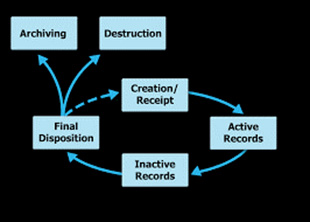 Records management is a fundamental activity of public administration. It is a management process responsible for the efficient and systematic control of the creation, receipt, maintenance, use and disposition of records while maintaining the records’ integrity, authenticity, reliability, and accessibility. Although there is as yet no national policy or legislation on public records management, the National Archives provides advisory services and training to Government Ministries, Department and Agencies (MDAs) on the management of public records throughout its lifecycle, based on international standards and best practices.
Records management is a fundamental activity of public administration. It is a management process responsible for the efficient and systematic control of the creation, receipt, maintenance, use and disposition of records while maintaining the records’ integrity, authenticity, reliability, and accessibility. Although there is as yet no national policy or legislation on public records management, the National Archives provides advisory services and training to Government Ministries, Department and Agencies (MDAs) on the management of public records throughout its lifecycle, based on international standards and best practices.
The records life cycle comprises use of records as current or active records, their secondary or inactive use, and then disposition of records either by destruction or transfer to the National Archives for their enduring historical and research value.
The Records Lifecycle
The National Archives provides storage of inactive or non-current records for MDAs at its Records Centre located in Chaguaramas.
 Without records there can be no rule of law, no accountability and good governance as well as effective and efficient administration. It forms the basis for formulating policy, managing resources, delivering services to the public and protecting the rights of citizens. Additionally, citizens need to be confident that the information they provide to government will be held securely, shared responsibly and made available as accurate proof of their entitlements when needed.
Without records there can be no rule of law, no accountability and good governance as well as effective and efficient administration. It forms the basis for formulating policy, managing resources, delivering services to the public and protecting the rights of citizens. Additionally, citizens need to be confident that the information they provide to government will be held securely, shared responsibly and made available as accurate proof of their entitlements when needed.
Examples of records linked to governance objectives
| Governance Objectives and Records | |
|
Governance Objective |
Key Records required |
|
Rule of Law |
• legislative records |
|
Accountability |
• accounting records |
|
Management of State Resources |
• budget papers |
|
Protection of entitlements |
• pension records |
|
Services for citizens |
• hospital records |
|
Foreign relations and international |
• treaties |
|
Source: ICA/IRMT The Management of Public Sector Records: Principles and Context |
|
Benefits of records management
- Contributes to the smooth operation and delivery of public programmes and services by making the information needed for decision making and operations readily available
- Meets legislative, legal, administrative, fiscal, audit and other regulatory requirements
- Supports and documents policy formulation and managerial decision-making
- Provides consistency, continuity and productivity in management and administration
- Provides protection and support in litigation
- Facilitates unobstructed and timely public access to secure, accurate and reliable government information such as meeting Freedom of Information requests.
- Builds public trust
- Protects the rights and entitlements of citizens
- Protects the rights of MDAs and their employees
- Maintains collective memory and national identity of Trinidad and Tobago
- Provides continuity in the event of a disaster
- Protects records from inappropriate and unauthorized access. This ensures the protection of privacy and confidentiality, and prevents the inappropriate disclosure of information that could harm the organisation or infringe the privacy rights of individuals.
- Supports anti-corruption strategies
- Facilitates interoperability in an electronic records environment through
standardization of records management
- Frees up office space for other purposes by moving inactive records to storage facilities
- A retention and disposal schedule as part of a records management programme ensures that the organisation maintains only those records it really needs for functional purposes.
The following guidelines are available to assist Records Managers in managing and storing records in the Public Service:
- Sample Retention and Disposition Schedule for Files Which are Common to Most Ministries - (PDF coming soon)
- Storage and Vault Guidelines



